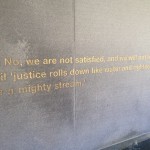The Big Picture
A sermon preached at the Church of the Incarnation, San Francisco, by Christopher L. Webber on January 3, 2016
“And the angel said to them, “Fear not, for behold I bring you good tidings of great joy which shall be to all people . . .”
“Fear not . . . good tidings of great joy . . .” That was last week’s news, the Christmas story. This week’s news is different. This time the angel says, “Run for your life; Herod is after you; get out while the getting is good.” So they flee for their lives, they escape to Egypt, and when they are told that it’s safe to come back they don’t dare return to Bethlehem but they go instead to  Nazareth in far off Galilee – California, you might say, instead of Washington – away from the corridors of power, out of the public eye, a place not quite so dangerous, and there Jesus will grow up.
Nazareth in far off Galilee – California, you might say, instead of Washington – away from the corridors of power, out of the public eye, a place not quite so dangerous, and there Jesus will grow up.
But once he begins his ministry, of course, the fear is right back, the looming threat of death; the powers that be are alarmed and plans are made to deal with this upstart and the path leads to crucifixion and death. “Fear not . . . I bring you good tidings of great joy.” That was last week. Last week we could have presents under a tree. This week it’s back to work, paying the bills, reading the headlines: mass shootings, refugees drowning in the Mediterranean, turned away at the border, but trying somehow, anyhow, to escape the violence around them. This week we are back to news of air pollution so severe life is suspended in major cities, news of storms sweeping away roads and homes, reports of a changing climate that threatens the fabric of our civilization, and a looming election with candidates playing to our fears, not our hopes.
“Fear not . . . tidings of great joy.” No wonder church attendance is down. The message seems more and more out of synch with the world around us. And no wonder so many politicians are finding acceptance for a message that says, “Be afraid; be very afraid.” Close the borders; be afraid of Mexicans, be afraid of refugees. Be afraid.
What I find most upsetting about that message is that the chorus is so often led by people claiming Christian faith. So-called “evangelicals” seem to be among the most fearful, most afraid of refugees, most afraid of their own government, most afraid of science, most afraid of a changing world. And, of course, there are good reasons for us to be afraid. The world is changing, good jobs are disappearing; whole cities, like Detroit, are being hollowed out. Do you know that the population of Detroit is down 40% in 30 years? What if that happened to San Francisco – if technology changed again and population went elsewhere? No wonder people feel insecure!
We live in a world where the rich get richer while the once secure struggle to keep up. For most of us, violence is less of a threat than ever. The number of gun deaths in the United States has been steadily going down for twenty years. Mass shootings may be more frequent; the fact that police killed almost 1000 people last year, most of them black, raises questions that cry out for answers. Terrorists killed 14 people in San Bernadino but gun owners are the biggest threat to themselves – more people are killed by their own gun than someone else’s. Terrorists – relatively – kill very few. Over 300,000 Americans have been killed by guns in the last ten years and 24 by terrorists – less than one in ten thousand. Lots of other people are creating a lot more havoc than terrorists.
It’s economics that’s hurting people, but corporations are faceless and anonymous and kill us quietly; it’s easier to worry about Mexicans or Moslems who threaten hardly anyone, than the corporate powers that are reshaping the world. It’s easier for demagogues to scare the voters of Iowa and New Hampshire with refugees or terrorists than to talk about the real threats to their security – economic change and climate change, easier to frighten us than to do the longer, harder work of building human relationships, of reaching out to those who come from different traditions – who may look different or speak with an accent but are also children of God and want only to live in peace.
I began by contrasting last week’s gospel news with this week’s gospel news, the proclamation of good tidings of joy and peace on the one hand, with the warning of death and the need to flee on the other. But the greater contrast may be within this week’s readings, between the first two readings and the Gospel. The Old Testament is really out of place. That reading ought to come next week. It’s all about God bringing God’s people back from the ends of the earth with rejoicing. Well, yes, but hold that thought for awhile. Before we rejoice with the Old Testament about bringing exiles back let’s hear the gospel about exiles being sent away. I’m getting a very mixed message.
But what I really want to look at this morning is neither the Old Testament nor the Gospel but that very short reading from the Epistle to the Ephesians. that seems to be on another subject entirely but may just provide the key we need to bring everything together:
“Blessed be the God and Father of our Lord Jesus Christ, who has blessed us in Christ with every spiritual blessing in the heavenly places, just as he chose us in Christ before the foundation of the world to be holy and blameless before him in love. He destined us for adoption as his children through Jesus Christ, according to the good pleasure of his will, to the praise of his glorious grace that he freely bestowed on us in the Beloved.”
“God chose us,” we are told, “before the foundation of the world.” In the midst of all the chaos and confusion know this, remember this: there is a plan and a purpose: God chose you before the foundation of the world. That message takes us back to the Christmas gospel read twice every year – once on  Christmas Day and once on the Sunday afterwards – the first verses of the Gospel of John: “In the beginning was the Word — and the Word was made flesh.” So here we have an Epistle that takes us back to the foundation of the world, back to the beginning, just as the Christmas Gospel does, and it reminds us that however confusing and chaotic the world around us appears to be there is a plan and a purpose, God is at work and we can be sure of the outcome.
Christmas Day and once on the Sunday afterwards – the first verses of the Gospel of John: “In the beginning was the Word — and the Word was made flesh.” So here we have an Epistle that takes us back to the foundation of the world, back to the beginning, just as the Christmas Gospel does, and it reminds us that however confusing and chaotic the world around us appears to be there is a plan and a purpose, God is at work and we can be sure of the outcome.
I don’t spend much time in art galleries but I went last fall to see an exhibit of the paintings of J W Turner at the DeYong Museum. I’m no expert, but I have always liked Turner’s wonderful swirls of color that convey a feeling more than any photograph could do. If you look closely at a photograph you may see details that escape you at a distance, but if you look closely at a great painting, what you see is brush strokes. You have to stand back to see the big picture.
I believe we need to step back sometimes and try to see the larger picture of this world, of the human story, of the working out of God’s purpose, and understand that our perspective is all too limited and distorted by our lack of understanding and vision. I wonder whether Paul in prison in Rome could have imagined a world in which Christianity – however distorted and imperfect – would shape the destinies of nations or whether George Washington at Valley Forge could ever have imagined a nation able to inspire the disenfranchised multitudes of Russia and China and even the disillusioned student protesters in Egypt and Syria. Look at the big picture.
I look at the evening news on television and I see an apparently hopeless quagmire in the Middle East and an American Congress unwilling to face down the NRA for sensible gun controls and unwilling to face down the oil and coal lobbies for sensible environmental action to save the world from unimaginable disasters and I find it hard to imagine that even God is able to do what needs to be done to save us from ourselves. But then we read this morning’s epistle telling us to remember that there has been a plan in place since the day before creation. There is a plan and a purpose. Look at the big picture. We can follow the steps of a desert tribe down into Egypt and up into the land of Canaan. We can read the words of the prophets foreseeing disaster and seeing a Messianic age beyond. We can look at the sufferings of the early church and the gradual spread of Christianity around the world and maybe we can get some sense of what Martin Luther King Jr had to say about how the moral arc of the universe may be long but it bends toward justice.
There was a hymn in the 1940 edition of The Hymnal that got dropped in 1982 for various reasons, not least because of the opening lines, “Once to every man and nation comes the moment to decide. . .” The hymnal authorities believed, and I agree with them, that critical moments may come more than once, that God does give us second and third chances and maybe more than that. But that hymn also said some true things that it’s good to remember:
Though the cause of evil prosper, yet the truth alone is strong;
Though her portion be the scaffold, and upon the throne be wrong;
Yet that scaffold sways the future, and behind the dim unknown,
Standeth God within the shadow, keeping watch above His own.
Martin Luther King, Jr. quoted that hymn in a speech and added the words of the prophet Isaiah, “But let justice roll down like the waters and righteousness like a mighty stream.” Just this last week I had the opportunity to see the King Memorial here in San Francisco where a literal stream of water rolls down  past a series of quotations from King. On the last night of his life he was able to speak of his confidence in the dream, confidence in the vision, and to say, “I have seen the promised land.” Well, we have not seen it. We may be more in the position of that small family forced to flee into Egypt, seeing the power of evil triumphant in many places. But God brought that family back and that helpless infant called followers to a vision that has shaped the world. No wonder the Epistle tells us that “God chose us in Christ before the foundation of the world and destined us for adoption as his children” and called us to be faithful, to be faithful in good days and bad. If we look at the big picture, we can see a worldwide church and a gospel known everywhere and a world in convulsions inspired by the dream of justice and peace.
past a series of quotations from King. On the last night of his life he was able to speak of his confidence in the dream, confidence in the vision, and to say, “I have seen the promised land.” Well, we have not seen it. We may be more in the position of that small family forced to flee into Egypt, seeing the power of evil triumphant in many places. But God brought that family back and that helpless infant called followers to a vision that has shaped the world. No wonder the Epistle tells us that “God chose us in Christ before the foundation of the world and destined us for adoption as his children” and called us to be faithful, to be faithful in good days and bad. If we look at the big picture, we can see a worldwide church and a gospel known everywhere and a world in convulsions inspired by the dream of justice and peace.
Another favorite hymn of mine, also not in the hymnal, puts it this way:
Who shall despair, though round us be confusion?
Though not for us the perfect order dawn?
The Day star is seen, the darkness disappearing.
O come, Son of Mary,
Jesu our redeemer,
O come, King triumphant, and reign on earth.
 Christopher L. Webber
Christopher L. Webber
I miss your sermons at St. Paul’s. If I can find the time (or make it. as it is rarely found) I will come back and read some more. Comment heard at coffee hour on Sunday. Officiant was David McIntosh from Kent. “That was a good sermon. Ten minutes on the dot and none of that personal stuff.” I thought pretty good, but canned and probably used several times. It is a tough job to keep ’em happy and I am not sure that should be the goal….made more thoughtful sounds better to me.